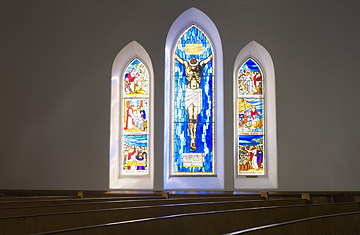
Millions of Americans go to church on Christmas Eve. They crowd shoulder-to-shoulder in pews to sing "Silent Night" and light candles and listen to soloists belt out "O Holy Night." More than a few watch nativity plays that recreate the birth of Jesus with a cast of 10-year-olds in bathrobes. When the service is over, they exchange hearty "Merry Christmas!" wishes before getting in their cars and heading home.
And they stay home the next day. Or they drive to Grandma's, or go to the movies. But however they spend Christmas Day — "the feast of Christmas" on the Christian liturgical calendar — one way most Americans don't celebrate it is by going to church. While demand for Christmas Eve celebrations is so high that some churches hold as many as five or six different services on the 24th of December, most Protestant churches are closed on the actual religious holiday. For most Christians, Christmas is a day for family, not faith.
If that sounds like the triumph of culture over religion, it is. By the middle of the 20th century, Americans had embraced a civil religion that among other things elevated the ideal of family to a sacrosanct level. The Norman Rockwell image of family gathered around the tree became a Christmas icon that rivaled the baby Jesus. And Christmas Eve services — with their pageantry and familiar traditions — became just one part of the celebration, after the family dinner and before the opening of presents.
That schedule of Christmas events is now the default tradition for most Americans. Some pastors understand the cultural emphasis but consider it an obstacle to focusing on the spiritual messages of Christmas. "We've seen churches embrace the Americana idea of Christmas," says Michael Hidalgo, lead pastor at the multi-denominational Denver Community Church. "Their heart is in the right place, but in some ways they end up looking like Target celebrating Christmas." Others, though, have accepted the idea that Christmas Day is a time for family instead of religious reflection. "I think it is our job to get Christmas off on the right foot...and then get out of the way," wrote one pastor at CreativeWorshipTour.com, in a discussion about Christmas services. "Let families celebrate by themselves."
When did Christmas Eve displace Christmas Day as the time for Christians to observe one of the two holiest days in the church year? Some traditions, including Catholics and Anglicans, hold midnight masses on the Saturday before Easter to usher in that holiday. But everyone still shows up the next morning for the traditional Easter celebration, just as Christmas Day remains a holy day of obligation for Roman Catholics, who are likely to be found in church the day after attending a Midnight Mass. By contrast, the Christmas service everyone thinks of as "traditional" is the Service of Lessons and Carols that many Protestant congregations use on Christmas Eve.
A mix of classic carols and Scripture readings, the format was developed in 1880 by Edward White Benson, who later served as Archbishop of Canterbury. The service was originally used by cathedrals and churches connected with British colleges and schools. Because the school terms ended before Christmas, the service gave the students and faculty a way of observing the holiday several weeks early. In 1918, however, it was modified by Eric Milner-White, the Dean of King's College, Cambridge, for a festival held on Christmas Eve. The format took off and has remained basically unchanged ever since.
The Service of Lessons and Carols eventually spread to the United States, where it became particularly popular in mainline Protestant churches. No similar format for Christmas Day ever took hold. Some Evangelical churches that personalize the figure of Jesus may also hold services on Christmas Day, but are a blend of traditional worship and birthday celebration, with songs like "Happy Birthday, Baby Jesus" and even birthday cake.
Even those ministers who are uncomfortable about the way Christmas Day has been elbowed off the religious calendar have a strong incentive not to push back. "Denver is such a transient city that our lowest numbers are the Sundays before and after Christmas," says Hidalgo, noting that many of his members return to their hometowns for Christmas. "We do a Christmas Eve service that plays to the people in our neighborhood. It's one of the few times that we can really make a deep connection with them."
The idea that Christmas Eve is a prime marketing opportunity to attract new members is widespread among pastors. In online forums, they give each other advice on crafting services that are broken down into digestible segments that will "hold the attention" of infrequent church-goers. (They also devote considerable space to trading concerns about the fire hazards posed by those Christmas Eve candles their congregants love holding.) One pastor said he considered regular Sunday services at his church to be "seeker-friendly," but holidays like Christmas and Easter were "seeker-focused." The irony is that by holding Christmas Eve services that cater to first-time visitors and shuttering their doors on Christmas Day, churches often fail to meet the spiritual needs of their longtime members on one of the holiest days of the year.
